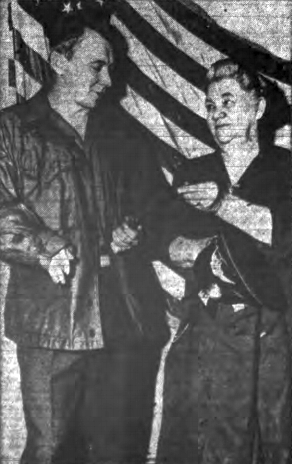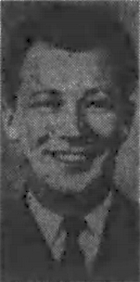Tom Koval
Ballplayers Wounded in Combat
| Date and Place of Birth: | March 7, 1915 Philadelphia, PA |
| Date and Place of Death: | December 8, 1984 Phildaelphia, PA |
| Baseball Experience: | Minor League |
| Position: | Outfield |
| Rank: | Private |
| Military Unit: | 80th Infantry Division US Army |
| Area Served: | European Theater of Operations |
Tom Koval, was born Thomas J. Kavalauskas, on March 7, 1915, in
Philadelphia, Pennsylvania. He attended Roman Catholic High School in
Philadelphia, before transferring to St. Mary's Prep School,
Connecticut, where he played baseball and football, and boxed. Following
graduation from St. Mary's, he played
baseball with the Southwark Men's Club, Fleisher, and the South
Phillies.
In 1939, Fred Lucas, a scout for the St. Louis Cardinals, signed him and
he had a trial with the Rochester Red Wings of the Class AA
International League, before being assigned to the Cambridge Cardinals
of the Class D Eastern Shore League. In 117 games, the big, powerful
center fielder batted .281 and hit 22 home runs. In 1940, Koval played
for the Asheville Tourists, the Springfield Cardinals and the Johnson
City Cardinals, hitting 19 home runs over the year. He was back with
Cambridge in 1941, and batted .326 with 16 home runs, advancing to the
Allentown Wings of the Class B Interstate League for 1942, where the
27-year-old batted .277 and hit a career-best 27 home runs.
In 1943, Koval advanced to the Rochester Red Wings and batted .242 in 86
games, before rejoining Allentown as player/manager for the last six
weeks of the season. In 32 games, he hit .227.
Koval entered military service on January 21, 1944, and served as a
rifleman with the 80th Infantry Division in Europe. He had been overseas
less than four months when he was seriously wounded by a German
machine-gunner. Koval was hit twice in the shoulder, twice in the back
and three times in the right arm, his throwing arm. Most of the bone
around the elbow was shot away.
"We were out on a demolition job, one other fellow and myself, near the
Luxembourg border," he recalled. "We'd placed our explosives outside a
Jerry pillbox and set the fuse. The fuse takes seven seconds to go off
and soon as we'd set it we started to get out of there. That's about the
time the Germans let go with the machine gun. They'd dropped back to a
concealed position about 70 yards from the pillbox and sat back and
waited for us to get out in the open. Luckily, I was hit after I'd
gotten far enough from the pillbox to miss the blast. My buddy didn't."
After convalescing for two months in England, Koval came back to the
United States in February 1945. He was a patient for two months at
Oliver General Hospital, in Augusta, Georgia, then was transferred to
Ashford General Hospital at White Sulphur Springs, West Virginia. "I've
had so many operations I've lost count," he said in mid-1946. "The
doctors have done a
great job. They plan two more major operations, and if they're
successful I'll be able to move the fingers again. If they aren't -
well, I'm willing to keep trying as long as they say so."
"Back from the wars with a shattered, lifeless right arm, [Koval] is
through at 28 as a baseball player," wrote Ed Klein in the Philadelphia
Inquirer in February 1946, "but he is ready to put on his spikes again
the first chance he gets to coach or manage.
"A quiet-spoken six-footer with streaks of prematurely-grey hair," wrote
Ed Klein in the Philadelphia Inquirer in February 1946, "[Koval] focused
a cheerful eye toward the future yesterday and summed up his chances to
stay in baseball. 'I've had this arm injury for more than a year,' he
said, 'and I've had a lot of time to figure just where I stand. I'm
finished as a player — that's sure. I have no regrets about that. I'm
lucky to be alive and to have gotten out as well as I did. There's more
to baseball than playing. I love the sport and I'd like to stay in it. I
managed Allentown for about six weeks before I was inducted and I'm sure
I could make good if I got another chance. I haven't heard anything
definite, but I'm hopeful I will soon.'"
Koval learned to play one-handed golf on Ashford's course. He underwent
a bone fusion and had further operations involving a nerve repair and
tendon transplant. "I've had so many operations I've lost count," he
said in 1946. "The doctors have done a great job. They plan two more
operations, and if they're successful
I'll be able to move the fingers again. If they aren't — well, I'm
willing to keep trying as long as they say so.
"I have no regrets," he said, when asked the question. "If that's the
way it had to be, that's it."
The job as a minor league manager didn't happen. Back home in
Philadelphia, he learned clerical work on the docks and became a member
of Clerks & Checkers Local 1242 of the International Longshoremen's
Union. He also became active in civic and veterans' groups. In 1948,
Koval was presented with a lifetime pass to all major and minor league
games. George M. Trautman, president of the National Association of
Professional Baseball Clubs announced in May of that year, that passes
would be made available to "all players whose careers were ended because
of injuries or illness received in the line of duty."
Tom Koval, who lived in Center City, Pennsylvania, passed away on
December 8, 1984, at the Einstein Medical Center in Philadelphia. He was
69 years old and is buried at Holy Cross Cemetery in Yeadon,
Pennsylvania.

Tom Koval showing his mother some of the
Nazi souvenirs he brought home
Date Added January 30, 2018
Can you add more information to this biography and help make it the best online resource for this player? Contact us by email
Read Baseball's Greatest Sacrifice Through The Years - an online year-by-year account of military related deaths of ballplayers
Baseball's Greatest Sacrifice is associated with Baseball Almanac
Baseball's Greatest Sacrifice is proud to be sponsored by


